| Back to the archive | |

| |
October 2021 | |
|
| |
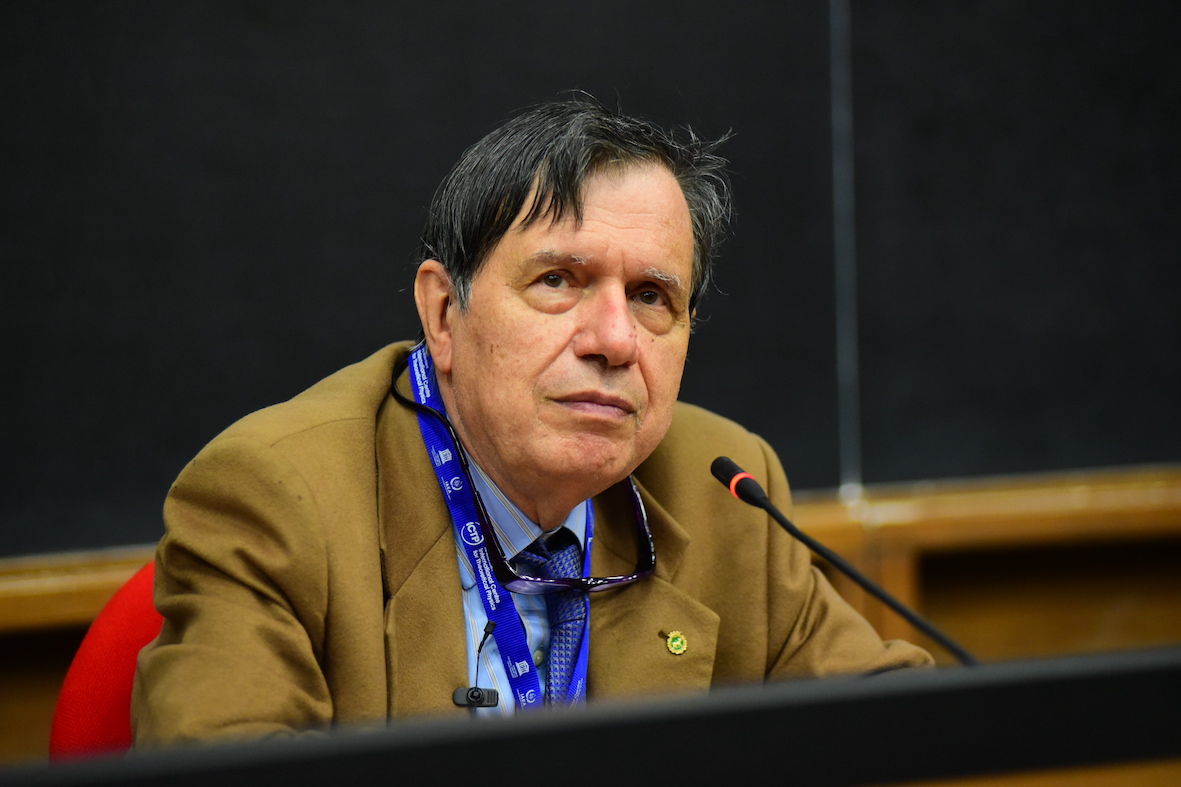 Giorgio Parisi Awarded the Physics NobelICTP Dirac Medallist Giorgio Parisi has received one-half of this year's Nobel Prize in Physics sharing the award with two other laureates for their studies of chaotic and apparently random phenomena. Parisi's Nobel Prize honours his "discovery of the interplay of disorder and fluctuations in physical systems from atomic to planetary scales." A professor of theoretical physics at the University of Rome "La Sapienza," he has strong connections with ICTP. In 1999, he won the Centre's Dirac Medal and currently serves as a member of the selection committee for that Medal.Read more ... | |
 Physics Nobel for Climate ScienceClimate scientists around the world applauded the decision by this year's Physics Nobel committee to award one half of the 2021 prize to Syukoro Manabe and Klaus Hasselmann for their pioneering work on developing climate models. The two Laureates shared this year's prize with theoretical physicist Giorgio Parisi under the common theme of "groundbreaking contributions to our understanding of complex physical systems." Researchers in ICTP's Earth System Physics (ESP) section were among the scientists welcoming the news about the prize and its focus on climate. Read more ... | |
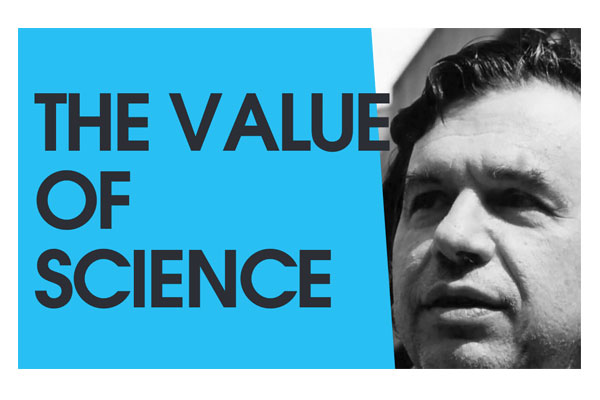 The Value of Science: Giorgio Parisi Colloquium2021 Physics Nobel Laureate Giorgio Parisi gave a Joint ICTP - Scuola Internazionale Superiore di Studi Avanzati (SISSA) Colloquium on October 22, his first public talk since the announcement of his Nobel Prize on 5 October. Titled "The Value of Science", Parisi spoke about the primary drive that pushes scientists to do their job. It is known, in fact, that an advancement in pure science brings with it many practical applications potentially beneficial for society: “It is not possible to think of technological development without advancement in pure sciences” claims Parisi "but, often, that is not what leads scientists towards these achievements. Their effort is primarily driven by the pleasure to pursue knowledge."A recording of the Colloquium can be watched now or read more ... | |
Celebrating the 2020 Dirac MedallistsICTP celebrated the 2020 Dirac Medal and Prize winners this week, honoring André Neveu of University of Montpellier, Pierre Ramond of University of Florida, and the late Miguel Virasoro of Universidad Nacional de General Sarmiento – "for their pioneering contributions to the inception and formulation of string theory which introduced new Bosonic and Fermionic symmetries into physics." The full announcement and the full citation of their win describes their work. The ceremony included an In Memoriam event honoring the late Dirac Medal Winner Miguel Virasoro, with invited speakers Giorgio Parisi, Gabriele Veneziano, Daniele Amati, and Atish Dabholkar highlighting Virasoro's scientific work. A recording of the Dirac ceremony and Virasoro memoriam can be viewed on ICTP's YouTube page. | Open Science ColloquiumContinuing its focus on open access and open science, ICTP hosted arXiv founder Paul Ginsparg, Professor of Physics and Information Science at Cornell University, for an online colloquium 6 October. In his talk, titled "Lessons from arXiv's 30 Years of Information Sharing", Ginsparg reviewed the history of the popular open-access repository of scientific e-prints, with a look at the impact of open access on scholarly research and access.Watch it here |
New Tunisian Prime Minister has Links to ICTPSeismologist and ICTP collaborator Najla Bouden Romdhane has been named the new Prime Minister of Tunisia, the first woman to hold that role in the country and in the Arab world. She is a professor of earthquake engineering at the Tunis National School of Engineering, University of Tunis El Manar, and previously worked within the Tunisian Ministry of Higher Education and Scientific Research. Romdhane has visited Trieste and ICTP several times over the years, collaborating with ICTP scientists on research projects related to the study of earthquake hazards.Read more ... | ICTP Postdoc Honoured with SKM PrizeThe German Physical Society (DPG) recently honoured ICTP postdoctoral fellow Sarah Loos with the Doctoral Thesis Award of the Sektion kondensierte Materie (SKM). The award recognises outstanding scientific work and its excellent presentation in a lecture, with the citation “for her dissertation and the lecture entitled 'The thermodynamics of stochastic systems with time delay." She completed her doctoral work at Technische Universität Berlin, where she achieved her doctorate with highest honours. |
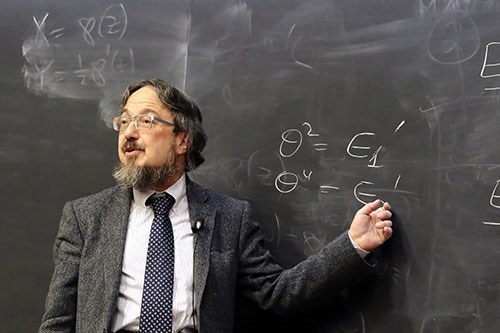 Fudan-Zhongzhi Award to Don ZagierMathematician Don Zagier has been awarded the Fudan-Zhongzhi Science Award 2021. An Emeritus Scientific Member and Director of the Max Planck Institute for Mathematics and holder of ICTP's Ramanujan International Chair, Zagier shares the prize with Benedict Gross, Emeritus Professor of Mathematics at Harvard University and the University of California, San Diego, for their formulation and proof of the Gross-Zagier formula.Read more ... | |
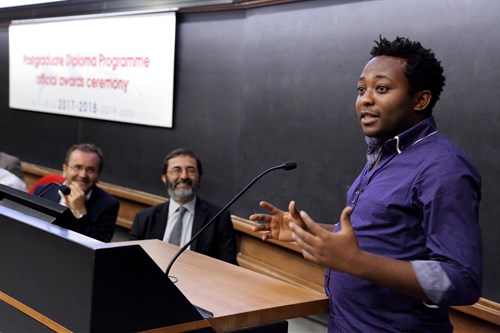 FallingWalls Prize to ICTP Alumni Project"We are living in a society where not only Africans but also all over the world, scientists are disconnected from society, from decision makers," says ICTP alumni Stefane Kenmoe. The need to make connections inspired Kenmoe to start the Making Science the Star project, which was recently selected as one of the twenty winners of the 2021 Falling Walls Engage competition.Read more ... | |
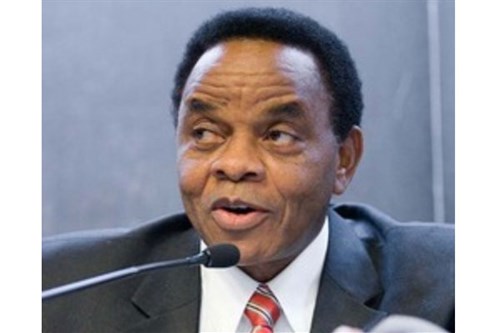 In Memoriam: Charles ChidumeICTP is mourning the passing of Nigerian mathematician Charles Chidume. Professor Chidume was an ICTP staff member from 1992 to 2009 in the Mathematics section, and coordinated the section's Diploma courses from 1992 to 2007. He was a founding member of the African University of Science and Technology (AUST) and, at the time of his death, had been AUST's acting president. He was the recipient of the 2019 AMMSI-Phillip Griffiths Prize and a Fellow of The World Academy of Sciences. ICTP mathematician Lothar Göttsche remembers Chidume: "He built the Diploma Programme in mathematics and was for many years its coordinator, building it into a strong programme. He cared very much about the students and was very generous with his help for them, and helped many to start a career in mathematics". | |
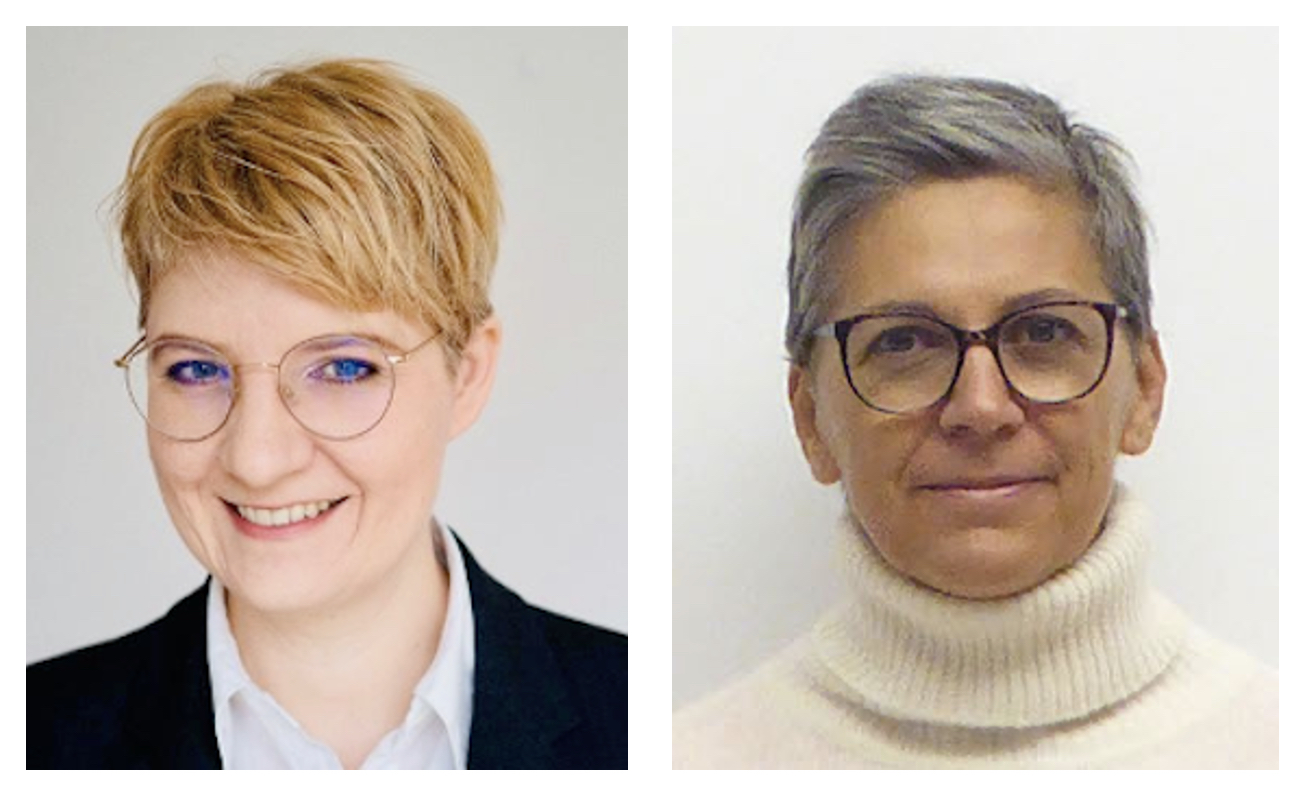 ICTP Hires New Library Director, Advancement OfficerICTP is pleased to welcome two new hires who are filling key positions at the Centre: Eva Babonich (above left) has been appointed as the new head of the Marie Curie Library. She comes with years of experience in library management, most recently as leader of the Service and Information Unit at Graz University of Technology - Library and Archives. In Graz she developed and implemented Publication Services that supported researchers with publishing Open Access. She was trained at the Austrian National Library and holds a Master's Degree in Library and Information Studies from the University of Vienna. ICTP has also appointed Corinne Degoutte as its new Fundraising and Advancement Officer. A graduate of ESSEC Business School, she has years of experience in fundraising for higher education and research institutions, including ParisTech, École des Ponts, ESSEC Business School, and ESPCI Paris, where she has set up and support resource development strategies. Her management experience includes leading the MBA International Luxury Brand Management at ESSEC. | |
|
Opportunities | |
Mathematics Postdoc FellowshipsICTP's Mathematics section is now accepting applications for postdoctoral fellowships that would start in September 2022. The application deadline is 9 January 2022. The fellowships have a 24-month duration with a possible extension for a further period of 12 months. Successful candidates might be offered a Shiing-Shen Chern Senior Postdoctoral Fellowship. The Fellowship, named after Shiing-Shen Chern, has especially attractive terms with a total possible tenure of 3+2 years.Find out more ... | Mathematics Fellowships OpeningsICTP and the International Centre for Pure and Applied Mathematics (CIMPA) have opened a call for applications for the CIMPA-ICTP Fellowships 2022 "Research in Pairs." The fellowships programme makes it possible for researchers in mathematics based in a developing country to come to Europe to collaborate with a colleague for a period of at least 6 weeks. Applications for a visit between March and the end of December 2022 are open until 31 December 2021.Find out more ... |
High Energy, Cosmology and Astrophysics Postdoc FellowshipsCome work with ICTP's high energy physicists: Several postdoctoral positions are open in ICTP's High Energy, Cosmology and Astroparticle Physics (HECAP) section with an expected starting date in October 2022. Appointments will be for 2+1 years. From string theory to particle physics and cosmology to topological field theories, scientists from a variety fields will find the section a fertile research ground. Applications should be sent by 28 November 2021.Find out more .... | Quantitative Life Sciences Postdoc FellowshipsICTP's Quantitative Life Sciences (QLS) section seeks applications for a postdoctoral position starting spring or summer 2022 from outstanding young scientists of any nationality with a strong research record. The QLS section provides a unique international research environment for postdoctoral fellows, with about 15 group members (faculty, postdocs, graduate students, and visitors), an intense programme of workshops and conferences, with a dense network of international research collaborations. The application deadline is 15 December 2021.Find out more .... |
Condensed Matter and Statistical Physics Postdoc FellowshipsICTP seeks applications for postdoctoral positions in its Condensed Matter and Statistical Physics section starting Fall 2022 from outstanding young scientists of any nationality with a strong research record. Appointments will be made for two years, with the possibility of renewal for a further year. The application deadline is 20 December 2021.Find out more ... | |
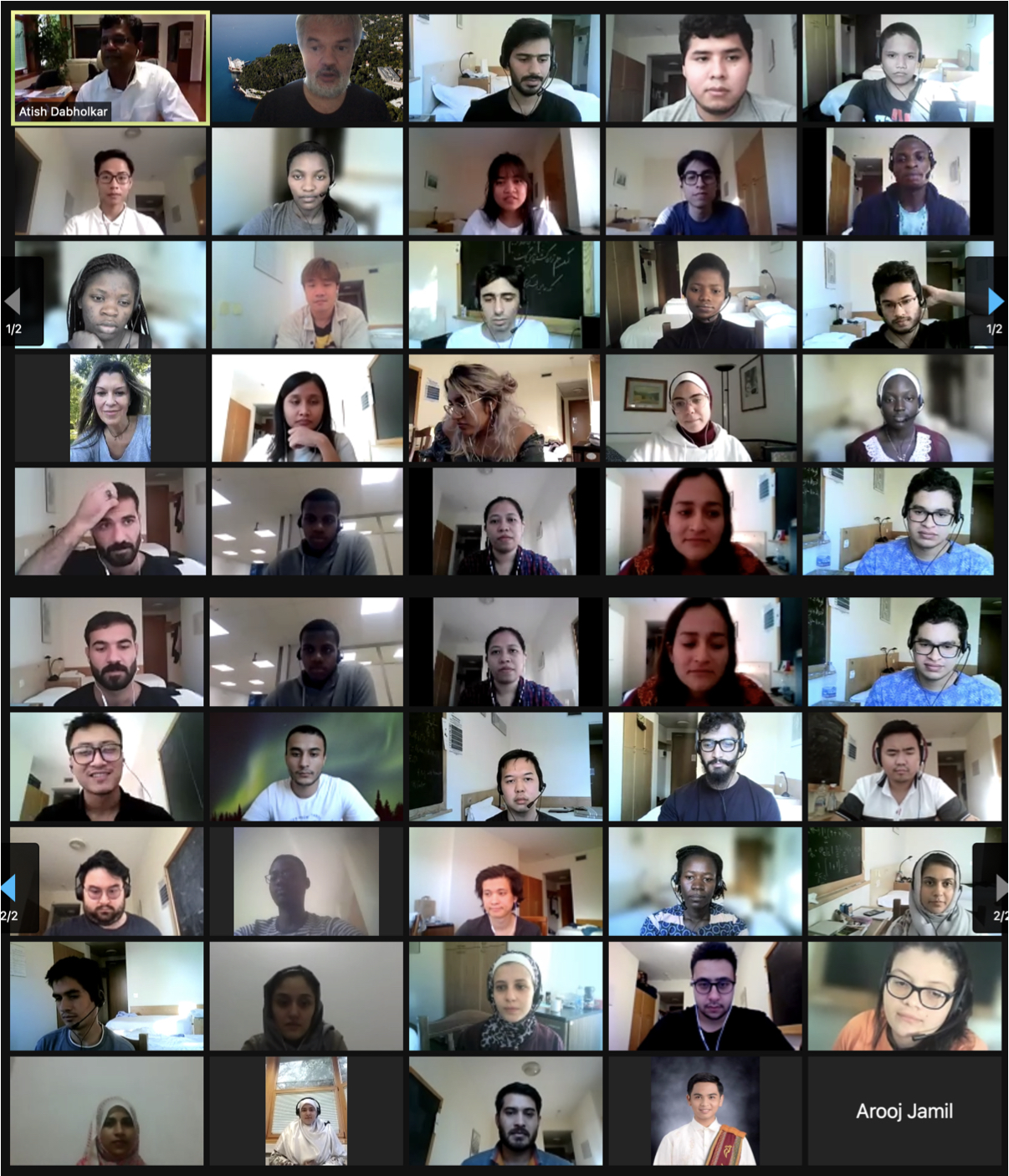 ICTP welcomed the new class of Diploma students: congratulations and good luck to the Diploma Class of 2022! | |
|
ICTP Research Digest | |
Keeping Healthcare Workers Healthy with ModellingDuring a global pandemic, as we all have learned, keeping the medical workforce healthy is crucial for avoiding preventable deaths. ICTP Quantitative Life Sciences researcher Edgar Roldan and colleagues wanted to know how different work schedules for a hospital's staff might affect their overall health, as they work in a situation where social distancing is impossible. What would be the best organisational strategy for a large hospital, based on a complicated set of factors, including infection levels, symptom levels, temporary immunity, and susceptibility to infection? Modifying mathematical models commonly used in epidemiology to simulate the health and productivity of the workforce, the research group found that alternating completely separate teams of workers every seven days decreases the number of staff infections. Given the urgent need to protect caretakers as well as help them be as productive as possible during an emerging pandemic, where knowledge is rapidly developing and different infection rates are possible, the team believes that the "model is a starting point to study how to protect healthcare workers while determining economic impact during a pandemic outbreak."Dive into the paper | |
 Convection's Role in ClimateUnderstanding the thunderstorms that generate all tropical rainfall could turn out to be key to understanding overall climate sensitivity. If these convective thunderstorms become more clustered together as the climate warms, they could act to regulate the heat that escapes to space in much the same way as the opening and closing of the iris regulates the light entering our eyes. But if instead convection becomes more spatially random, it would act as an "inverse iris" that amplifies global warming. ESP scientist Adrian Tompkins has co-authored a paper with Ethiopian scientist Addisu Semie from the University of Addis Ababa which uses a convection-resolving model coupled to a simple ocean to explore how ocean feedbacks can impact clustering of these thunderstorms. "When surface winds are light, mixing in the upper ocean is reduced and the ocean becomes very sensitive to changes in heat fluxes," explains Tompkins. "In these circumstances, we found that ocean feedbacks could prevent clustering from happening at all, leading to a much moister atmosphere and drastically reducing the tropic's ability to lose heat to space." The work has implications for global climate models, our main tools for assessing climate sensitivity. "Climate models use coarse grids that cannot represent these storms explicitly, and therefore representation of clustering at scales below 200km is completely lacking," explains Tompkins. "Even in cloud-resolving models, clustering differs drastically from model to model, and thus understanding how it works is key to improving our assessment of potential future climate change in the tropics."Dive into the paper | |
Expanding the Potential of a System-on-a-ChipMost computers are full of components, from a central processing unit (CPU) to graphics and memory components. Sometimes, however, a fully functioning microcomputer that integrates all of these components on a single chip can be quite useful: a System-on-a-Chip. A team of researchers in the ICTP Science, Technology, and Innovation section (STI) took up the challenge of exploring the many applications of a fully programmable System-on-a-Chip (SoC). The team set up a remote access laboratory for an advanced online school, co-organised with the International Atomic Energy Agency, to look at SoC and its applications to scientific instrumentation; attendees mainly included physicists, computer scientists and engineers from developing countries. The use of e-learning tools, which some of them adopted and others developed, allowed the school participants to directly access both integrated development environment software and programmable SoC platforms. Projects undertaken during the activity included X-ray and Nuclear Spectroscopy and Radiotracer Techniques in Environmental Monitoring. The results from the school and the exploration of the many applications of SoC is explored in a new paper by the STI team.Dive into the paper | |
|
Important links | |
|
Remote Learning Resources at ICTP:
https://www.ictp.it/about-ictp/media-centre/news/2020/3/ictp-videos.aspx Virtual Seminars: https://www.ictp.it/about-ictp/virtual-seminars.aspx ICTP Scientific Calendar: https://www.ictp.it/home/scientific-calendar Marie Curie Library: https://library.ictp.it/ | |





| |
|
Abdus Salam International Centre for Theoretical Physics Strada Costiera 11 34151 Trieste, Italy sci_info@ictp.it Copyright© 2021 All Rights Reserved You received this email because you are registered to receive news from ICTP. Click here to unsubscribe. |
|